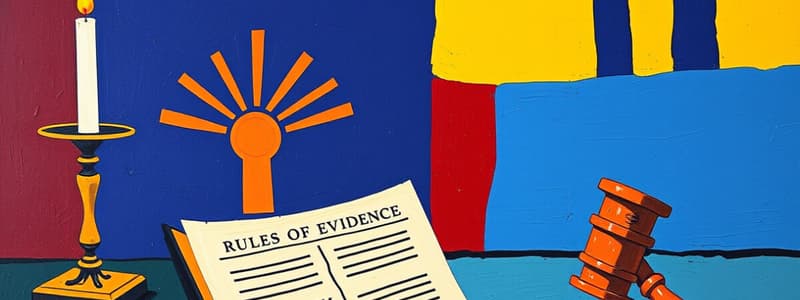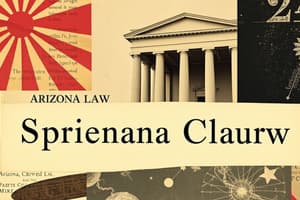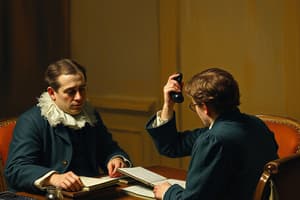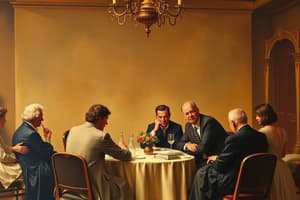Podcast
Questions and Answers
What must a party do upon request regarding a witness's prior statement?
What must a party do upon request regarding a witness's prior statement?
- Disclose its contents to the court only
- Provide the statement to the witness immediately
- Give a summary of the statement to the jury
- Show or disclose its contents to the adverse party's attorney (correct)
Under what condition is extrinsic evidence of a prior inconsistent statement admissible?
Under what condition is extrinsic evidence of a prior inconsistent statement admissible?
- Only if the witness is not allowed to explain the statement
- If the adverse party can present new evidence against it
- If the statement is corroborated by additional witnesses
- If the witness is given a chance to explain or deny it (correct)
Which of the following statements is NOT true regarding Rule 613?
Which of the following statements is NOT true regarding Rule 613?
- The rule allows certain statements made by opposing parties to be excluded
- An adverse party must be given the opportunity to examine the witness on the statement
- The rule was amended for stylistic consistency with federal rules
- Extrinsic evidence must always be shown to the witness before being admissible (correct)
What does Rule 613 specifically exclude regarding opposing party’s statements?
What does Rule 613 specifically exclude regarding opposing party’s statements?
How does the 2012 amendment to Rule 613 change the original rule?
How does the 2012 amendment to Rule 613 change the original rule?
Which of the following statements accurately describes the scope of Rule 201?
Which of the following statements accurately describes the scope of Rule 201?
What must a court do if a party requests judicial notice and provides necessary information?
What must a court do if a party requests judicial notice and provides necessary information?
In a civil case, how must a court instruct the jury regarding a fact that has been judicially noticed?
In a civil case, how must a court instruct the jury regarding a fact that has been judicially noticed?
What constitutes relevant evidence according to Rule 401?
What constitutes relevant evidence according to Rule 401?
Which of the following statements about irrelevant evidence is correct?
Which of the following statements about irrelevant evidence is correct?
Which of the following is NOT a condition under which facts may be judicially noticed?
Which of the following is NOT a condition under which facts may be judicially noticed?
What is the main purpose of the amendments made to Rule 401 in 2012?
What is the main purpose of the amendments made to Rule 401 in 2012?
Under what circumstance may a court take judicial notice?
Under what circumstance may a court take judicial notice?
What type of evidence is generally not admissible to prove the validity of a disputed claim?
What type of evidence is generally not admissible to prove the validity of a disputed claim?
Under what condition can the court admit evidence that is typically not admissible?
Under what condition can the court admit evidence that is typically not admissible?
What does Rule 501 primarily address regarding claims of privilege?
What does Rule 501 primarily address regarding claims of privilege?
What is the purpose of the privilege established in Rule 503?
What is the purpose of the privilege established in Rule 503?
Before a witness testifies, what must they do regarding their commitment to truthfulness?
Before a witness testifies, what must they do regarding their commitment to truthfulness?
What options does an adverse party have if a witness uses a writing to refresh their memory during testimony?
What options does an adverse party have if a witness uses a writing to refresh their memory during testimony?
Who has the authority to impeach a witness according to Rule 607?
Who has the authority to impeach a witness according to Rule 607?
What must happen if a writing that refreshes a witness's memory is not produced when ordered?
What must happen if a writing that refreshes a witness's memory is not produced when ordered?
Which of the following was removed from Rule 408 to improve readability?
Which of the following was removed from Rule 408 to improve readability?
What is the potential consequence of failing to produce evidence in a criminal case as specified in Rule 612?
What is the potential consequence of failing to produce evidence in a criminal case as specified in Rule 612?
Why were stylistic changes made to Rule 604 regarding interpreters?
Why were stylistic changes made to Rule 604 regarding interpreters?
When can statements made during compromise negotiations be admissible?
When can statements made during compromise negotiations be admissible?
Which of the following is not included as an exception to the inadmissibility of evidence related to compromise negotiations?
Which of the following is not included as an exception to the inadmissibility of evidence related to compromise negotiations?
Which aspect of the evidence rules does the 2012 amendment to Rule 408 NOT change?
Which aspect of the evidence rules does the 2012 amendment to Rule 408 NOT change?
Which hearsay exception applies to a statement made immediately after a shocking event occurs?
Which hearsay exception applies to a statement made immediately after a shocking event occurs?
Which factor is least relevant when assessing witness credibility?
Which factor is least relevant when assessing witness credibility?
What is a requirement for expert testimony to be considered admissible?
What is a requirement for expert testimony to be considered admissible?
Which statement best exemplifies evidence that may be excluded despite its relevance?
Which statement best exemplifies evidence that may be excluded despite its relevance?
Which of the following is NOT a type of privilege recognized in the rules of evidence?
Which of the following is NOT a type of privilege recognized in the rules of evidence?
Which is an acceptable method for impeaching a witness?
Which is an acceptable method for impeaching a witness?
In which context is a statement for medical diagnosis admissible as an exception to hearsay?
In which context is a statement for medical diagnosis admissible as an exception to hearsay?
What does the relevance of evidence determine within a trial?
What does the relevance of evidence determine within a trial?
What does Rule 401 establish regarding evidence?
What does Rule 401 establish regarding evidence?
What is the primary purpose of Rule 501 regarding privileges?
What is the primary purpose of Rule 501 regarding privileges?
Who is designated as eligible to impeach a witness according to Rule 607?
Who is designated as eligible to impeach a witness according to Rule 607?
What does Rule 608 cover regarding witness credibility?
What does Rule 608 cover regarding witness credibility?
What is a requirement of a witness under Rule 603 before testifying?
What is a requirement of a witness under Rule 603 before testifying?
What is the main consideration under Rule 401 concerning evidence?
What is the main consideration under Rule 401 concerning evidence?
Which of the following statements accurately describes the purpose of Rule 503?
Which of the following statements accurately describes the purpose of Rule 503?
What does Rule 612 specifically address regarding witness testimony?
What does Rule 612 specifically address regarding witness testimony?
Under which circumstance is evidence typically admissible according to Rule 408?
Under which circumstance is evidence typically admissible according to Rule 408?
What requirement is specified by Rule 603 for witnesses prior to testifying?
What requirement is specified by Rule 603 for witnesses prior to testifying?
Flashcards
Judicial Notice of Adjudicative Facts
Judicial Notice of Adjudicative Facts
Recognizing facts commonly known or proven from reliable sources, without formal proof.
Adjudicative Facts
Adjudicative Facts
Specific facts needed for decision-making in a case.
Legislative Facts
Legislative Facts
Facts used to inform legal rules, not the specifics of a case.
Relevant Evidence
Relevant Evidence
Signup and view all the flashcards
Compromise Offers
Compromise Offers
Signup and view all the flashcards
Hearsay
Hearsay
Signup and view all the flashcards
Present Sense Impression
Present Sense Impression
Signup and view all the flashcards
Excited Utterance
Excited Utterance
Signup and view all the flashcards
Statement for Medical Diagnosis or Treatment
Statement for Medical Diagnosis or Treatment
Signup and view all the flashcards
Business Records
Business Records
Signup and view all the flashcards
Public Records and Reports
Public Records and Reports
Signup and view all the flashcards
Declarations Against Interest
Declarations Against Interest
Signup and view all the flashcards
Witness Credibility
Witness Credibility
Signup and view all the flashcards
Witness Impeachment
Witness Impeachment
Signup and view all the flashcards
Expert Testimony
Expert Testimony
Signup and view all the flashcards
Relevance
Relevance
Signup and view all the flashcards
Admissibility
Admissibility
Signup and view all the flashcards
Privilege
Privilege
Signup and view all the flashcards
Attorney-Client Privilege
Attorney-Client Privilege
Signup and view all the flashcards
Refreshing Witness's Memory
Refreshing Witness's Memory
Signup and view all the flashcards
Witness's Prior Statements
Witness's Prior Statements
Signup and view all the flashcards
Study Notes
Judicial Notice of Adjudicative Facts (Rule 201)
- Governs only judicial notice of adjudicative facts, not legislative facts.
- Facts that may be judicially noticed:
- Generally known within the trial court's jurisdiction.
- Determined from reliable sources.
- Courts can take judicial notice:
- On their own or upon request from a party.
- Can be taken at any stage of proceedings.
- Parties have the right to be heard on the propriety of judicial notice.
- In civil cases, juries must accept noticed facts as conclusive; in criminal cases, juries may choose to accept them.
Relevant Evidence (Rule 401)
- Evidence is considered relevant if it affects the probability of a fact and the fact is consequential in the case.
- Rule aims for clarity and consistency with federal standards; no changes in admissibility outcomes.
Compromise Offers and Negotiations (Rule 408)
- Prohibits the use of evidence related to compromise offers to prove or disprove claims.
- Exceptions allow admission of such evidence to show witness bias or efforts to obstruct justice.
- Amendments enhance readability without altering substantive law.
Privilege in General (Rule 501)
- Common law governs claims of privilege unless overridden by statutes or constitutional provisions.
- Amendments align language for better understanding while maintaining court interpretations.
Legal Paraprofessional Communications (Rule 503)
- Communications with legal paraprofessionals are privileged if made for legal advice, in confidence, and treated confidentially, mirroring attorney-client privilege.
Oath or Affirmation to Testify (Rule 603)
- Witnesses must affirm truthfulness before testifying to ensure credibility.
Interpreters (Rule 604)
- Interpreters must be qualified and take an oath to ensure truthful translations.
Witness Impeachment (Rule 607)
- Any party, including the one that called the witness, can challenge the witness's credibility.
Refreshing Witness's Memory (Rule 612)
- Provides procedures for adverse parties if a witness uses a writing to refresh memory.
- Adverse parties can request to inspect the writing and have portions introduced into evidence.
- Noncompliance may lead to the striking of testimony or mistrials in criminal cases.
Witness's Prior Statements (Rule 613)
- Parties may examine witnesses about prior statements without showing documents immediately.
- Extrinsic evidence of inconsistent statements is only admissible after the witness has had a chance to explain or deny the statement.
General Comments on Rules
- Amendments throughout rules focus on stylistic changes to improve clarity and consistency without altering legal outcomes related to evidence admissibility.
Hearsay Exceptions
- Hearsay is defined as statements made outside of court that cannot be used to prove the truth of the matter asserted.
- Present Sense Impression allows statements describing an event concurrent with its occurrence to be admissible.
- Excited Utterance refers to spontaneous statements made in reaction to a startling event, often considered reliable due to the immediacy of the response.
- Statements for Medical Diagnosis or Treatment include declarations made for medical purposes that are admissible due to their necessity in understanding a patient's condition.
- Business Records are documents created in the regular business course, recognized for their inherent reliability.
- Public Records and Reports consist of official documents or reports maintained by governmental entities and are generally admissible.
- Declarations Against Interest include statements that are contrary to the declarant's interest, making them credible as they would not typically be made unless true.
Witness Credibility
- Credibility assessment considers the demeanor and manner of the witness during testimony.
- Factors such as the witness's interest or bias, any prior convictions, and previous behavior are crucial in evaluation.
- The presence of corroborating evidence strengthens a witness's credibility, while its absence can undermine it.
- Impeachment Methods include rigorous cross-examination, presenting contradictory evidence, and highlighting prior inconsistent statements to challenge a witness's reliability.
Expert Testimony
- Experts must possess specialized knowledge, skills, experience, or education relevant to the matter at hand to qualify as such.
- Experts may base their opinions on personal knowledge, reliable principles and methods, or on facts and data not admissible separately, as long as these contribute to the expert's opinion.
- Relevance and Reliability are essential; testimony must directly relate to the case and be scientifically validated to be admissible.
Relevance and Admissibility
- Relevance pertains to evidence that makes a fact more or less probable, serving as a key criterion for admissibility.
- Evidence may be excluded if considered more prejudicial than probative, obscuring the issues or misleading the jury.
- Rules of Exclusion target hearsay, irrelevant information, and privileged communications that do not contribute constructively to a case.
Privileges and Immunities
- Different types of privileges exist, protecting confidential communications:
- Attorney-Client Privilege safeguards discussions between attorneys and clients.
- Doctor-Patient Privilege secures confidential medical information exchanged between a doctor and a patient.
- Spousal Privilege protects conversations between married individuals from forced disclosure.
- These privileges can be waived, and exceptions may apply, particularly in instances involving crime or fraud.
Judicial Notice of Adjudicative Facts (Rule 201)
- Allows courts to recognize facts that are generally known or can be accurately and readily determined without requiring proof.
- Aimed at promoting efficiency by eliminating the need for formal proof of certain facts.
Test for Relevant Evidence (Rule 401)
- Defines relevant evidence as that which makes a fact of consequence more or less probable than it would be without the evidence.
- Establishes the standard for determining an evidence's applicability in supporting or challenging a claim.
General Admissibility of Relevant Evidence (Rule 402)
- States that relevant evidence is generally admissible unless prohibited by law, the Constitution, or specific rules.
- Emphasizes the importance of relevance in legal proceedings for truth-finding.
Compromise Offers and Negotiations (Rule 408)
- Protects offers made during negotiations of a compromise from being admitted as evidence to prove liability or the validity of a claim.
- Encourages settlement discussions by ensuring that parties can negotiate freely without fear of their statements being used against them in court.
Privilege in General (Rule 501)
- Addresses the concept of legal privileges, which protect certain communications from disclosure in legal proceedings.
- Includes recognized privileges such as attorney-client, doctor-patient, and spousal privileges among others.
Legal Paraprofessional (Rule 503)
- Defines the role and function of legal paraprofessionals in providing assistance under the supervision of licensed attorneys.
- Establishes guidelines for their work and the limits of their responsibilities in legal matters.
Oath or Affirmation to Testify Truthfully (Rule 603)
- Requires witnesses to take an oath or affirmation to testify truthfully before giving evidence.
- Serves to ensure the integrity of testimony and the judicial process.
Interpreters (Rule 604)
- Mandates the use of qualified interpreters for witnesses who do not speak English or have hearing impairments.
- Ensures that all parties can fully understand and participate in the judicial process.
Who May Impeach a Witness (Rule 607)
- Permits any party, including the party that called the witness, to challenge or attack the credibility of a witness.
- This rule allows for a more thorough examination of the credibility and reliability of witness testimonies.
Writing Used to Refresh a Witness’s Memory (Rule 612)
- Allows witnesses to use documents or writings to help refresh their memory while testifying.
- Conditions apply to ensure the evidence is suitable and relevant to the inquiry.
Witness’s Prior Statements (Rule 613)
- Governs the use of prior statements made by witnesses to impeach or support their credibility.
- Establishes procedures for introducing these statements in court, including the importance of context and timing.
Judicial Notice of Adjudicative Facts (Rule 201)
- Allows courts to recognize facts that are generally known or can be accurately and readily determined without requiring proof.
- Aimed at promoting efficiency by eliminating the need for formal proof of certain facts.
Test for Relevant Evidence (Rule 401)
- Defines relevant evidence as that which makes a fact of consequence more or less probable than it would be without the evidence.
- Establishes the standard for determining an evidence's applicability in supporting or challenging a claim.
General Admissibility of Relevant Evidence (Rule 402)
- States that relevant evidence is generally admissible unless prohibited by law, the Constitution, or specific rules.
- Emphasizes the importance of relevance in legal proceedings for truth-finding.
Compromise Offers and Negotiations (Rule 408)
- Protects offers made during negotiations of a compromise from being admitted as evidence to prove liability or the validity of a claim.
- Encourages settlement discussions by ensuring that parties can negotiate freely without fear of their statements being used against them in court.
Privilege in General (Rule 501)
- Addresses the concept of legal privileges, which protect certain communications from disclosure in legal proceedings.
- Includes recognized privileges such as attorney-client, doctor-patient, and spousal privileges among others.
Legal Paraprofessional (Rule 503)
- Defines the role and function of legal paraprofessionals in providing assistance under the supervision of licensed attorneys.
- Establishes guidelines for their work and the limits of their responsibilities in legal matters.
Oath or Affirmation to Testify Truthfully (Rule 603)
- Requires witnesses to take an oath or affirmation to testify truthfully before giving evidence.
- Serves to ensure the integrity of testimony and the judicial process.
Interpreters (Rule 604)
- Mandates the use of qualified interpreters for witnesses who do not speak English or have hearing impairments.
- Ensures that all parties can fully understand and participate in the judicial process.
Who May Impeach a Witness (Rule 607)
- Permits any party, including the party that called the witness, to challenge or attack the credibility of a witness.
- This rule allows for a more thorough examination of the credibility and reliability of witness testimonies.
Writing Used to Refresh a Witness’s Memory (Rule 612)
- Allows witnesses to use documents or writings to help refresh their memory while testifying.
- Conditions apply to ensure the evidence is suitable and relevant to the inquiry.
Witness’s Prior Statements (Rule 613)
- Governs the use of prior statements made by witnesses to impeach or support their credibility.
- Establishes procedures for introducing these statements in court, including the importance of context and timing.
Studying That Suits You
Use AI to generate personalized quizzes and flashcards to suit your learning preferences.
Description
Explore the Arizona Rules of Evidence, which governs judicial notice of adjudicative facts. Understand the scope of this rule and the types of facts that may be judicially noticed in court. Test your knowledge of these principles!




